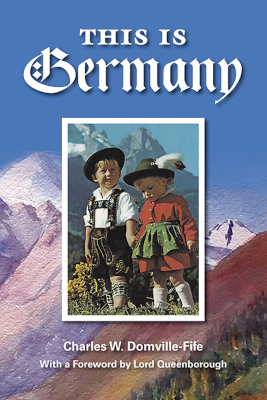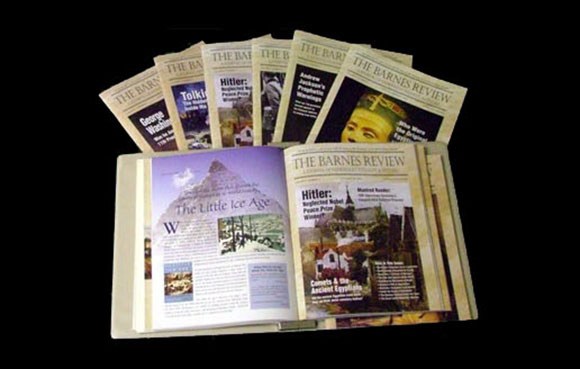THIS IS GERMANY

This is Germany: The country, the people and the Third Reich system of life and government, described from personal experience and with the assistance of many of the leaders of both thought and action in the New Germany. By Charles W. Domville-Fife, Foreword by Lord Queensborough.
A sweeping snapshot of Germany in 1938, written by one of Britain’s most prolific military and travel writers, and introduced by the then President of the British Conservative Party. It provides one of the most accurate English-language overviews of all aspects of Hitler’s Germany ever written, but was completely suppressed after the outbreak of the Second World War in the same year that it was published.
With 18 chapters dealing with every possible aspect of German life, from tourist attractions to the inner workings of the “Strength through Joy” program, this work boasts 55 unique photographs designed to illustrate the author’s always enthralling account.
Included in the overview are two chapters dealing with the financial and economic systems employed by the Third Reich which allowed it to overcome the crushing unemployment problem and national shortages which brought the country to ruin prior to 1933. These chapters—and the revelations therein—were of particular interest to the author and his circle, and provide dramatic insights into price control, worker-employer relations, public building programs, and much more.
In addition, this book delves deeply into how the totalitarian state was set up, and shows how the authoritarian nature of that state carried with it the notion of absolute responsibility—for better or worse, unlike democracies where no-one is ever personally held accountable for governmental failures.
Other aspects of German life discussed include: agricultural policies and food self-sufficiency, the place of women in the Reich, the Reich Labour Service for men and women, the youth movements and how youth delinquency was all but eradicated, policies designed to boost population growth and birth rates, taxation policies, educational systems, land reclamation projects, and the futuristic building plans for Germany’s major cities.
This new edition is the first republication of this book since 1939—and the reader will soon find out why it was suppressed. An invaluable work for anyone wanting to understand how peacetime Hitlerian Germany operated.
About the author: Charles William Domville-Fife (1886-1960) was a prolific British military and travel writer. Serving in the Royal Navy during World War I and obtaining the rank of Lieutenant in the Royal Naval Volunteer Reserve (RNVR), Domville-Fife lectured at the H.M. School of Submarine Mining in Plymouth. There he wrote a number of highly successful works on submarine warfare, and thereafter retired to devote himself full time to travel writing.
Lord Queensborough, born Almeric Hugh Paget, 1st Baron Queenborough, GBE (1861– ) was a British industrialist and Conservative Party politician. A staunch anti-Communist, he twice held the office of President of the National Union of Conservative and Unionist Associations—the precursor to the present-day British Conservative Party conference committee, from 1928–29 and 1940–41.
Table of Contents
- Foreword
- About the Author
- Chapter One: “You will again be a mighty nation . . .”
- Chapter Two: The Berlin of the Third Reich
- Chapter Three: The Political & Administrative Organization of the State
- Chapter Four: Shades of Potsdam & Lights of the Wannsee
- Chapter Five: The Reich Academy & State System of Physical Culture
- Chapter Six: The Financial & Economic System
- Chapter Seven: The Financial & Economic System
- Chapter Eight: Speeding to Stettin
- Chapter Nine: Along the North Sea & Baltic Coasts
- Chapter Ten: “Strength through Joy”
- Chapter Eleven: Yesterday & To-day in the Cities of the Hanse
- Chapter Twelve: Labour & the Land
- Chapter Thirteen: Industrial Germany
- Chapter Fourteen: Women’s Part in the New Germany
- Chapter Fifteen: Reality & Romance from Rhine to Alps
- Chapter Sixteen: Youth in the New Germany
- Chapter Seventeen: Munich—Cradle of the Third Reich
- Chapter Eighteen: Expansion—The Ostmark & Sudetenland
- Index
List of Illustrations
- Adolf Hitler, Reich Chancellor of the New Germany
- Party day, 1927. A photograph from the “days of struggle” which lasted from 1920 to 1933.
- A model of the New Berlin, as planned by Hitler.
- The massive dome will be the centrepiece of the new capital city.
- What the completed dome will look like inside.
- The UFA Palace cinema. Decorated for Hitler’s birthday.
- An early picture of a Brown Shirt detachment.
- Originally created to protect party meetings from attack by the communists, the Brown Shirts have become a part of everyday life in Germany.
- A model of the Tempelhof Airport as it will look like once completed.
- The aircraft reception area.
- The passenger arrival and departure buildings.
- Plan of the New Berlin.
- The Black Guards. Hitler’s personal bodyguards on parade.
- Adolf Hitler greets a child. The Reich Chancellor’s love of children is well-known.
- Potsdam. The grand streets and the dom in the background.
- The palace at Sans-Souci. Residence of Frederick the Great.
- Wannsee Lake. A popular Berlin playground.
- The Reich Sports Field, Berlin. This view from the air, taken while flying over the immense buildings of the Academy of Physical Culture, shows, in the foreground, the large outdoor swimming pool, the vast stadium, and the restaurant in the background. Sports grounds, indoor pools and playing fields extend for thousands of acres to the right of this photograph; and on the left can be seen the pylons and the Adolf Hitler Platz.
- General Goering, head of the Four Year Plan, in discussion with the Reich Chancellor.
- Germany’s Autobahnen. The best motor highways in the world. The gracious curves of the roads.
- One of the many new bridges.
- Stettin. The old city and harbour.
- On the beach at Warnemünde.
- The entrance to the Adolf Hitler Koog.
- A K.d.F. train full of holiday makers.
- The K.d.F passenger ship Oceana.
- The K.d.F ship Wilhelm Gustloff.
- On board a K.d.F ship.
- Hamburg. The busy metropolis and port.
- The town hall at Hamburg.
- The Reich Labour Service. A parade at a rally in Nuremberg.
- Soldiers of the land. A platoon of the labour corps marching away from camp to the “field of action.”
- Gertrude Scholtz-Klink. Reich woman’s leader.
- Volunteers in the labour corps. German girls and boys in the labour corps set out for the day’s work.
- Mother’s school. Young girls are taught the art of motherhood.
- Bride’s school. Woman engaged to be married to men in military or other government field services receive training in all aspects of housekeeping.
- Ordensburg Vogelsang. Where the future leaders of the Reich are trained.
- The “one pot meal” winter help programme. A street scene in Berlin where families have a “one pot meal” and then donate what they would have spent on a full meal to the winter help programme.
- The winter help programme in action. A needy German family receive new shoes from the winter help programme.
- Rothenburg. The perfectly preserved town dates from the Middle Ages.
- Hitler Youth ready for travel. Hitler Youth at a berlin train station waiting to go to the countryside for a camp.
- Happy boys at camp. A group of happy Hitler Youth at their tent.
- Hitler and some children at Berchtesgaden. The guards always let children approach the Führer.
- Hitler and his youth. The young love Hitler, as is evident from this photograph.
- Bund Deutscher Mädel at a Nuremberg rally.
- Bund Deutscher Mädel girls at a camp.
- The spirit of young Germany. Trumpeters of the “Hitler Youth.”
- The Brown House. Headquarters of the N.S.D.A.P.
- The new buildings on the Königsplatz. From left to right: the “Führer Building” (where the Munich conference was held), the first Temple of Honour, the Brown House (set back), the second Temple of Honour, and the second “Führer Building.”
- The House of German Art. A new art museum in central Munich.
- The Black Guard in Munich. Standing watch over the Honour Temples of those who were killed on 9 November 1923.
- The tombs of those killed on 9 November 1923. Inside the open-air Honour Temples on the Königsplatz.
- The honour guard at the Feldherrnhalle. This is the place where the police opened fire on the Hitler column on 9 November 1923.
- Brannau-am-inn. The house in which Hitler was born is now proudly decorated.
- Neuschwanstein Castle: a painting by Adolf Hitler (1914).
- The adoration of the Sudeten Germans. The expression of adoration of these Sudeten Germans for their Führer is clearly visible on their faces as he drives across the border, 3 October 1938.
288 pages. 55 unique photographs.
Softcover, 288 pages, $27 plus $5 S&H inside the U.S. . Order this book by clicking here.
Remember: 10% off retail price for TBR subscribers. Use coupon code TBRSub10 if you are an active subscriber to claim your discount on books and other great products, excluding subscriptions.
Order online from the TBR Store using the links above or call 202-547-5586 or toll free 877-773-9077 Mon.-Thu. 9-5 ET with questions or to order by phone.
Know someone who might be interested in our books?
Forward this email to your friend by clicking here.
|


